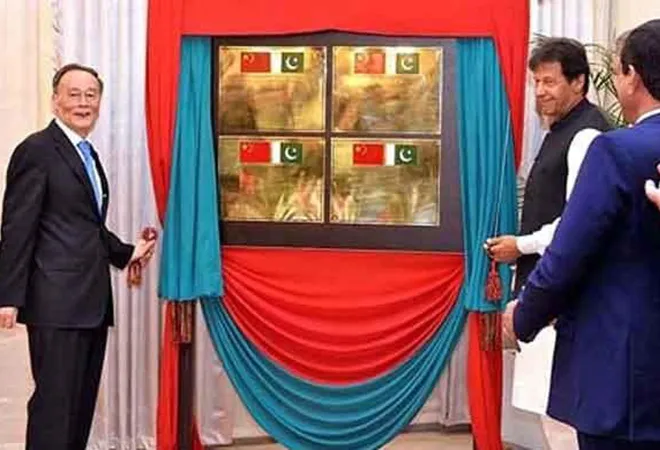An internal report of a committee formed by the Pakistani government in August 2019 has shed light on corruption and lack of transparency in the projects related to the China-Pakistan Economic corridor (CPEC). The report has uncovered Beijing’s real intentions behind the CPEC, often hailed as the symbol of Pakistan-China bonhomie. The CPEC’s final objective is said to be exploiting Pakistan’s shirking economy through the creation of corrupt elite and a friendly army establishment.
The CPEC was officially launched in 2013. It is a pilot project of China’s ‘Belt and Road Initiative’ (BRI). According to the World Bank, Beijing has invested more than $62 billion in infrastructure, energy projects and dams under various CPEC projects in Pakistan. The Chinese Communist Party (CCP) maintains that the CPEC will bring political stability and economic resilience as well as help Beijing secure its domestic energy supplies.
According to Chinese officials, the CPEC will create around 2.3 million jobs in Pakistan by 2030. Furthermore, the congenial relationship between the two countries under BRI’s quasi-alliance serves as a counter-weight to the growing US-India strategic cooperation in the region.
While Pakistan’s military establishment and civilian leaders have always looked to Beijing as their backer against India, the cost of this consistent support from Beijing has come with costs. Unlike the democracies of global south, China has always interacted with every nation to suit its own vested economic interests.
For these state-centric economic intentions and interests, Beijing has always tried to create social structures within dependent countries. These social structures in turn serve China-centric motives in security and economic self-aggrandisement. Through the CPEC, China created these social structures in the Pakistani army as well as in its supportive civilian government.
Imran Khan and CPEC
Praised as the country’s economic lifeline by the political leaders of Pakistan, the CEPC, since its inception, has been marred by allegations of corruption and high costs of investments. In 2017, the CPEC infrastructural projects faced grave criticism on corruption, forcing Beijing to stop funding for three major road projects.
The charges of corruption and increasing resentment among the people also drove the Pakistani government to stop the road projects worth one-trillion Pakistani rupees. Following this development, Beijing was forced to work on new guidelines before the money was released.
Against this backdrop, Imran Khan, now the Prime Minister, but then in the Opposition, and his party Tehreek-e-Insaf used the rising levels of corruption in the CPEC projects in their election campaigns. The Tehreek-e-Insaf and Imran Khan not only protested against the CPEC, but officially articulated their reservations to Chinese diplomats from 2016 onwards.
Soon after taking office, in August 201, Imran Khan and Tahreek-e-Insaf announced that all CPEC agreements would be reviewed to address the allegations of special concessions to Chinese companies and corruption. The most vocal among the members of Tahreek-e-Insaf was Commerce Minister Abdul Razak Dawood who suggested that Islamabad should suspend the CPEC.
However, after coming to power, Imran Khan and his party could do virtually nothing, because of many important reasons. First, the crumbling domestic economy of Pakistan has no alternative except depending excessively on China.
Second, Pakistan’s all-powerful military establishment, especially the current Chief of Army Staff (COAS), Gen Qamar Javed Bajwa’s soft corner for China. Gen Bajwa, the 16th COAS, has remained a loyal friend of China ever since he assumed office on 29 November 2016. He has also served Chinese interests well by assuring the security of Chinese workers, and the ongoing China-built infrastructure projects under the CPEC. The mutual bonhomie between China and the Pakistani military has seen considerable growth in the past decades.
Third, the CPEC has provided ample avenues for high-level corruption, on account of which, dissent has been blunted and criticism has been silenced with bribes. For example, the silence of Dawood, the most vocal critic of the CPEC and Chinese companies was just bought over, creating a win-win situation for both the political elites in Pakistan as well as for the Chinese government, at the expense of the common Pakistanis.
Imran Khan’s government awarded a contract of the Mohmand dam in the northern part of the country to Descon, a company founded by Dawood and China’s Gezhouba. The move led to a public outcry and the ground breaking ceremony for the dam construction had to be postponed twice.
Probe into energy projects
Pakistan is marred with energy crisis. Of the total $62 billion worth of CPEC projects, roughly $33 billion is expected to be invested in energy projects dominated by finances (80 percent) from China. However, the energy sector, especially the electricity sector, is in a massive crisis owing to decades of government apathy and negligence that has made Pakistan a highly energy insecure country.
To look into the problems, the government in last August set up a committee to audit the power sector and examine the high cost of electricity. The report showed that six China-funded power projects has given huge profits to firms from China as compared to existing market rates.
According to the report, some of the power projects, where no bidding process was followed, are 237 percent more expensive than other similar projects in neighbouring countries like India. Similar wrongdoings were highlighted about two coal-based power plants also.
It has been reported that $2.5-2.6 billion excess payments were made to Chinese firms. They have also revealed that projects have been awarded to Imran Khan’s sympathisers such as Abdul Razak Dawood and Nedeem Babar, who are among the top beneficiaries of these power sector scams. This audit report, however, was never made public by the government.
Pakistan has been facing increasing economic challenges after getting grey-listed by the Financial Action Task Force (FATF) since past one year. For example, from June 2019, Pakistan was once again placed under the FATF grey list, forcing Pakistan and Imran Khan to change their posture towards Beijing.
They both had to announce that the CPEC is Pakistan’s “top priority”. The announcement came when Yao Jing, China’s ambassador to Pakistan, announced that the first phase of the CPEC projects valued at $62 billion were either being completed or are near completion. He said the project was all set to move into its second phase. Only time will tell how much burden the people of Pakistan will have to face because of these CPEC projects.
This commentary originally appeared in South Asia Weekly.
The views expressed above belong to the author(s). ORF research and analyses now available on Telegram! Click here to access our curated content — blogs, longforms and interviews.




 PREV
PREV


